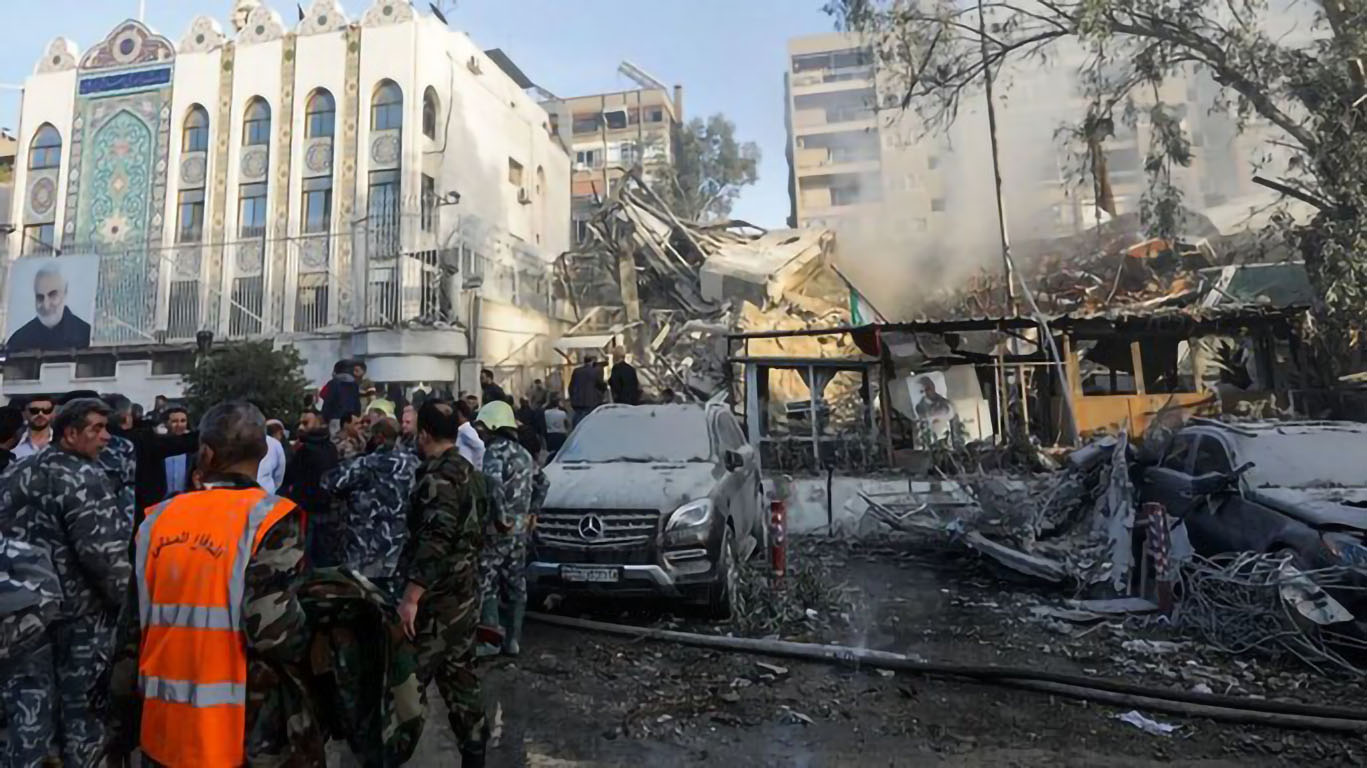Written by Mehdi Oghbai
Three-minute read
On April 1, reports indicated a massive attack on the Iranian regime’s consulate in Damascus, leaving several casualties, including seven senior commanders of the Revolutionary Guards (IRGC). While saber rattling and bragging about another “harsh revenge,” Tehran hasn’t done anything.
Many experts considered this attack one of the toughest military strikes against the Iranian regime, following the elimination of Qassem Soleimani, the commander of the IRGC’s extraterritorial Quds Force in 2020. Reports indicate that Tehran’s highest-ranking IRGC Quds Force commander in Syria, Mohammad Ali Zahedi, along with his deputy and chief of staff were killed in this strike.
While some tried to portray this attack as a part of a minor regional conflict, facts on the ground confirm this attack was the result of Tehran’s involvement in the current war in Gaza.
On April 3, the Council of the Coalition of Islamic Revolutionary Forces “honored (and announced) Zahedi’s role in the formation of the Resistance Front and the design of the Al-Aqsa storm operation by issuing a message.”
“Zahedi’s strategic role in the formation and strengthening of the resistance front, as well as the design and implementation of the Al-Aqsa storm, are great honors that will make this commander immortal in the history of the struggle against the occupying regime,” read the message, published by the state-run Mizan News Agency.
Since war broke out in Gaza, Iran’s religious tyranny adopted a deceptive policy. While some regime officials, including the IRGC’s spokesperson Ramezan Sharif, blatantly boasted about their direct role in the October 7 attack, other officials including Supreme Leader Ali Khamenei, denied any direct involvement in the conflict.
Yet, since day one, and countless times since the foundation of the Iranian regime, the Iranian Resistance announced that the “head of the snake” of warmongering is in Tehran. While the Western government tried to minimize Tehran’s role in the devastating war in Gaza, they soon had to engage with the regime’s proxies in different parts of the world.
Aside from undeniable facts confirming the regime’s involvement in what has led to the worst contemporary human tragedy, such as Tehran’s financial and material support of different terrorist proxy groups, there was another reason for Khamenei to start this war: Iran’s restive society.
Facing an explosive society, especially following five major uprisings that rattled its foundations, the regime desperately needed to export chaos abroad. Fearing a looming uprising, Khamanei instigated this war, right from his regime’s playbook, in a bid to export crises abroad. Seemingly, he has to face serious concerns about his warmongering.
Following Israel’s attack in Syria, regime officials, especially Khamenei, rushed to promise a “harsh revenge” at “a specified time and location” to “force the enemy to regret its deed.”
A few days later, nothing happened, causing more defection and increasing factional feuds in the regime.
Government-affiliated expert Mohammad Taqi Akayan, speaking in a televised interview on April 1, emphasized the gravity of recent events: “They have targeted our foremost commanders in the region. Yet, many among our populace remain unaware of the full extent of this catastrophe.”
“If we fail to deliver a direct and resolute response, rest assured, the regime’s machinations will resume imminently. They struck General Soleimani; we vowed fierce retaliation. They targeted Seyed Razi; we reiterated our commitment to unyielding retribution. They struck officials of Hashd al-Shaabi, Hezbollah, and we maintained our stance on severe retaliation. We promised to strike where they least expect it. The question remains: when will that moment arrive when they are caught off guard? Where will it originate?” he added.
“Authorities must cease employing the phrase ‘time and place for an answer’ in response to the enemy. This expression is becoming increasingly disgusting!” said Hamid Rasai, one of the regimes.’s members of parliament.
Khamenei finds himself in a precarious position. Choosing to retaliate against the attack escalates the possibility of direct confrontation, underscoring the imperative of “targeting the head of the snake.” Conversely, if Khamenei and his regime opt for inaction, discontent among regime forces will likely surge, heightening the prospect of a social upheaval. Consequently, Khamenei is ensnared in a quagmire: the more he endeavors to navigate, the deeper he sink
This article was first published by NCR-Iran
Join us on YouTube:
Iran Panorama
